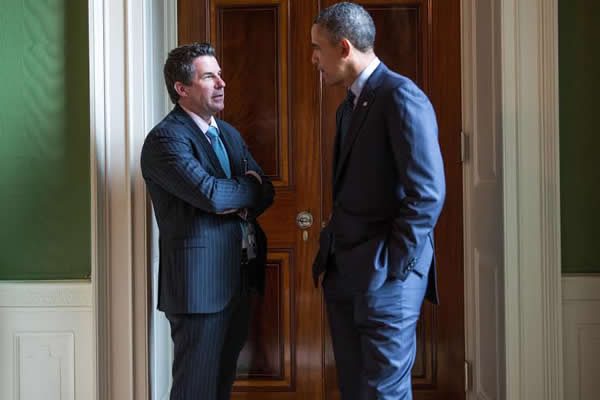Health
D.C. prepares to host Int’l AIDS Conference
Event expected to draw more than 30,000 to city from July 22-27
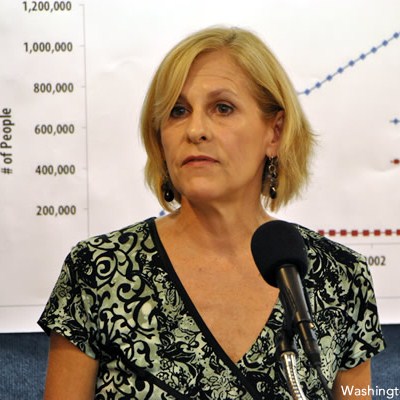
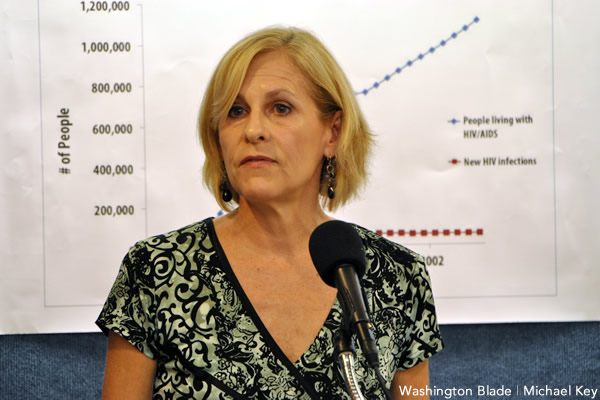
Julie Scofield, executive director of the National Alliance of State and Territorial AIDS Directors (Blade photo by Michael Key)
The International AIDS Conference is expected to draw more than 30,000 people from around the world to D.C. July 22-27.
Former President Bill Clinton, former first lady Laura Bush, Bill Gates of the Bill and Melinda Gates Foundation, Health and Human Services Secretary Kathleen Sebelius, U.S. Global AIDS Coordinator Eric Goosby, “The View” co-host Whoopi Goldberg and singer Elton John are among those who are scheduled to speak at the Walter E. Washington Convention Center. The White House has yet to confirm whether President Obama will attend; California Rep. Barbara Lee and Michel Sidibé, executive director of UNAIDS, are among those who are scheduled to speak at the opening session on July 22. The Gay Men’s Chorus of Washington is also slated to perform.
“We are gathering at a defining moment in the AIDS epidemic where the science tells us we can turn the tide on HIV,” said Dr. Elly Katabira, president of the International AIDS Society who serves as the conference’s international chair, and Dr. Diane Havlir of the University of California-San Francisco, who is the U.S. co-chair of AIDS 2012, in a statement that officially welcomed delegates to the nation’s capital. “Scientific advances are also propelling towards the efforts to find a cure and vaccine for HIV. AIDS 2012 will unite science, community and leadership from around the globe to develop strategies and mobilize support for translating new evidence into meaningful action that reflects HIV’s complex web of social, human rights and political issues.”
The conference — the theme of which is “Turning the Tide Together” — will feature a number of workshops and other events that will specifically discuss the epidemic’s impact among men who have sex with men and other LGBT communities. These will include networking spaces in the Global Village that will allow LGBT people and MSM to share strategies to more effectively respond to HIV and advocate on behalf of those living with the virus. “The Lancet” will also present a symposium on the epidemic’s impact among MSM on July 24.
Debbie McMillan of Transgender Health Empowerment will be among the panelists on a July 26 plenary that will examine the virus’ effects on at-risk populations. A symposium on the same day will discuss the future of HIV prevention and related health and human rights issues among gay, transgender and MSM communities.
The Blade is also an official media sponsor of the conference and will host a photo exhibit chronicling AIDS in Washington in the Global Village, which is open to the public.
A call to action
The International AIDS Society and the University of California-San Francisco on Tuesday unveiled a nine-point plan designed to further combat the global epidemic.
The “Washington, D.C., Declaration” specifically calls for an end to stigma, discrimination and human rights abuses against people with the virus and those who remain at-risk for HIV. It backs what it describes as evidence-based prevention, treatment and care that respects the human rights of “those at greatest risk and in greatest need.” The declaration further stresses the need for accelerated research on new HIV prevention initiatives, treatments and a vaccine.
UNAIDS noted in its 2010 report that an estimated 33.3 million people around the world live with HIV. The agency further reported that the number of new infections has fallen 19 percent since 1999. UNAIDS also found that 5.2 million of the estimated 15 million people with the virus in developing countries who need antiretroviral treatment receive it.
“In a scenario unthinkable just a few years ago, we now have the knowledge to begin to end AIDS in our lifetimes,” said Katabira, professor of medicine at Uganda’s Makerere University. “Yet, at this moment of extraordinary scientific progress and potential, the global response to AIDS faces crippling financial challenges that threaten past success and future progress. Through this declaration, we stand together to call on world leaders across all sectors to provide increased resources, visionary leadership and a full-fledged commitment to seize the opportunity before us.”
This year marks the first time since 1990 that the International AIDS Conference has taken place in the United States—President Obama in 2009 completed the process that lifted the ban on people with HIV from entering the country. City officials and HIV/AIDS service providers alike plan to use the biennial gathering to highlight local efforts to combat the epidemic.
D.C. Officials, HIV/AIDS groups seek presence at conference
The Department of Health’s HIV/AIDS, Hepatitis, Sexually Transmitted Disease and Tuberculosis Administration will present 15 scientific abstracts on the epidemic during the conference. The D.C. Center for AIDS Research, the body that coordinates HIV/AIDS-specific research in Washington, will highlight city-based research in a Global Village session. Mayor Vincent Gray is among those who will speak at a Memorial AIDS Quilt ceremony on July 22.
“It’s appropriate that AIDS 2012 is taking place in the District, its first return to the U.S. in 22 years, as the District has in so many ways been the face of our nation’s epidemic,” said D.C. Council member David Catania (I-At Large.) “From years of an inadequate and failed response to now, an increasingly effective and aggressive one, the District embodies the varied and diverse experience our nation has endured with the deadly disease. AIDS2012 will be a fantastic opportunity for the District to showcase its innovative prevention and treatment programs for the best and brightest in the field. The District stands as an example of what can occur when data-driven, evidence-based policies are put in place.”
Whitman-Walker Health will hold a forum on the state of the epidemic at the Lisner Auditorium, where the city’s first AIDS forum took place in 1983, on July 24. Metro Teen AIDS and Us Helping Us have also scheduled a series of events to coincide with the conference. Organizers have also organized tours of Helping Individual Prostitutes Survive, Food and Friends, La Clinica del Pueblo and other D.C. HIV/AIDS service organizations for delegates.
“We are pleased and honored to have the International AIDS Conference come to D.C.,” Dr. Ray Martins, chief medical officer at Whitman-Walker, told the Blade. “The conference gives the world a chance to learn more about the state of HIV/AIDS in the District of Columbia, but also the breadth of the response to the epidemic locally. It will allow us to highlight the tremendous efforts made by outreach workers and volunteers as well as health care providers and our elected officials.”
A number of gatherings, panels and other events will also take place throughout the city in the days leading up to the conference. These include the Gay Men’s Health Summit at George Washington University and the Global Forum on MSM and HIV on July 21, a panel on stigma in transgender and other HIV-vulnerable communities at the Human Rights Campaign on July 21 and Youth Force’s annual conference at Gallaudet University in Northeast Washington from July 17-19 and the International Network of Religious Leaders Living with or Personally Affected by HIV/AIDS’ conference at Howard University from July 17-19.
“It’s really an incredible event, so I’m glad it’s coming back here,” Ron Simmons, president of Us Helping Us, told the Blade. “With the eyes of the world focused on you, this is the time to take advantage of it.”
Calls to bolster response to domestic epidemic
HIV/AIDS activists also plan to use the conference to urge lawmakers in this country and around the world to reaffirm their commitment to ending the epidemic.
Policy makers also plan to urge Congress to adequately fund policies they say effectively combat the domestic epidemic.
“When people think of AIDS today, most probably don’t realize that AIDS is still really in a crisis mode in our country,” said Carl Schmid, deputy executive director at the AIDS Institute, during a press conference at the National Press Club in D.C. on Tuesday. He noted that 20 percent of the 1.2 million Americans with HIV today do not know their status. Schmid also pointed to roughly 50,000 new diagnoses each year. “Many, including our youth, have become complacent. With nearly 40 percent of new infections occurring in those under age 29 and with more HIV in our country than ever before, it is imperative that we raise our country’s consciousness.”
President Obama in 2010 unveiled a National HIV/AIDS Strategy that seeks to reduce rates of HIV and HIV-related health disparities and increase access to care for people with the virus.
Julie Scofield, executive director of the National Alliance of State and Territorial AIDS Directors, applauded the Obama administration for what she described during the National Press Club press conference as its ongoing commitment to fight the domestic epidemic. She stressed, however, that federal funding has not kept pace with the needs of those with HIV.
“It has always been important to acknowledge from the very beginning of this fight that the goals of the strategy cannot be achieved without significant increases in funding for critical domestic HIV/AIDS discretionary programs,” said Scofield.
Health
CVS Health agrees to cover new HIV prevention drug
‘Groundbreaking’ PrEP medication taken by injection once every six months
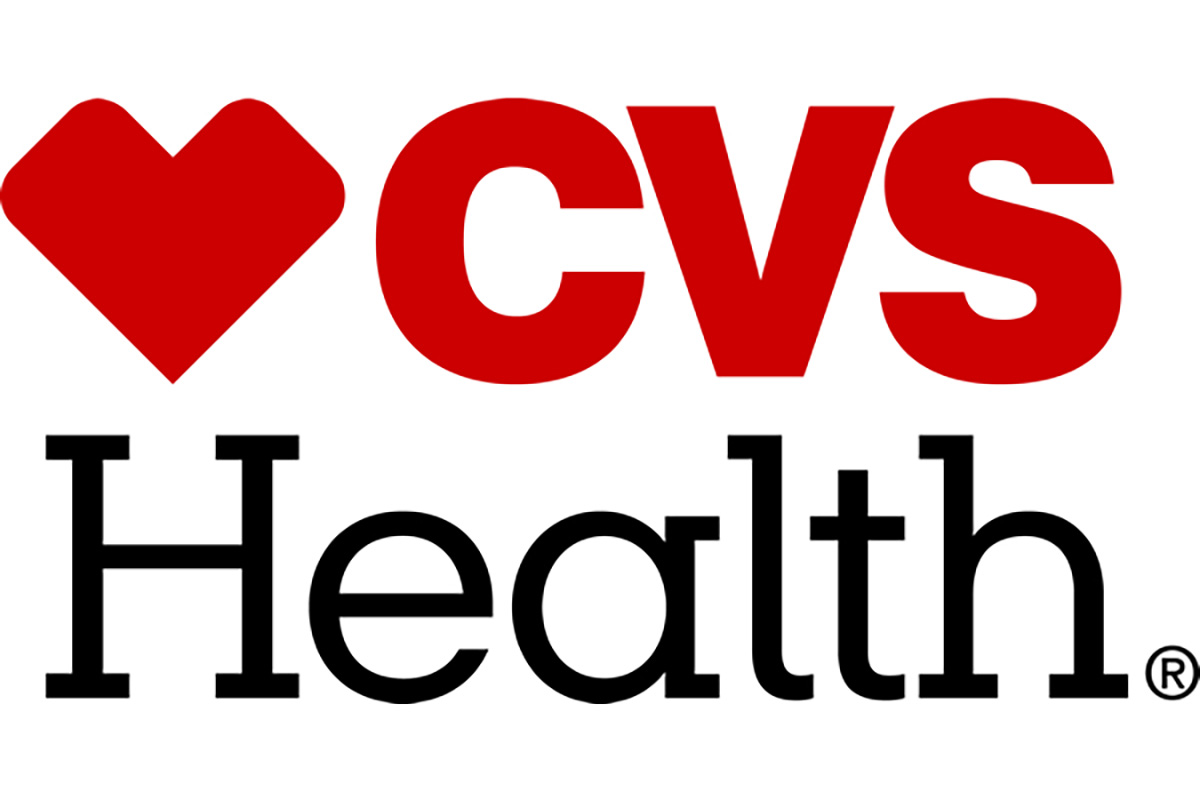
CVS Health, the nation’s second largest pharmacy benefit manager company that plays a key role in deciding which drugs are covered by health insurance policies, has belatedly agreed to cover the new highly acclaimed HIV prevention drug yeztugo.
The U.S. Food and Drug Administration approved the use of yeztugo as an HIV prevention or “PrEP” medication in June 2025 as the first such drug to be taken by injection just once every six months. AIDS activists hailed the drug as a major breakthrough in the longstanding effort to end the HIV epidemic.
“We are pleased that CVS Health has finally decided to cover this groundbreaking new PrEP mediation,” said Carl Schmid, executive director of the HIV+ Hepatitis Policy Institute.
“Four months ago, 63 HIV organizations joined us in sending a letter to CVS’s president urging them to reconsider their refusal to cover Yeztugo and reminding them of their legal obligation to cover PrEP and describe the important benefits the drug would bring to preventing HIV in the U.S.,” Schmid said in a statement.
He noted that CVS Health now joins other leading pharmacy benefit manager companies and insurers in covering yeztugo. Gilead Sciences, the pharmaceutical company that developed and manufactures yeztugo, has said 85 percent of all people with health insurance in the U.S. now have coverage for the drug, according to Schmid.
“However, coverage does not automatically translate into access and usage,” Schmid said in his statement. “Too many people are being forced to pay copays while other payers, including employers, are failing to cover all forms of PrEP,” he said.
According to Schmid, the HIV+ Hepatitis Policy Institute is joining other HIV advocacy organizations in urging federal and state government officials to engage in “aggressive enforcement of PrEP insurance coverage requirements and sustained funding of state, local, and community HIV prevention programs.”
Health
Choose U ambassadors share lived experiences with HIV, personal reflections, and insights
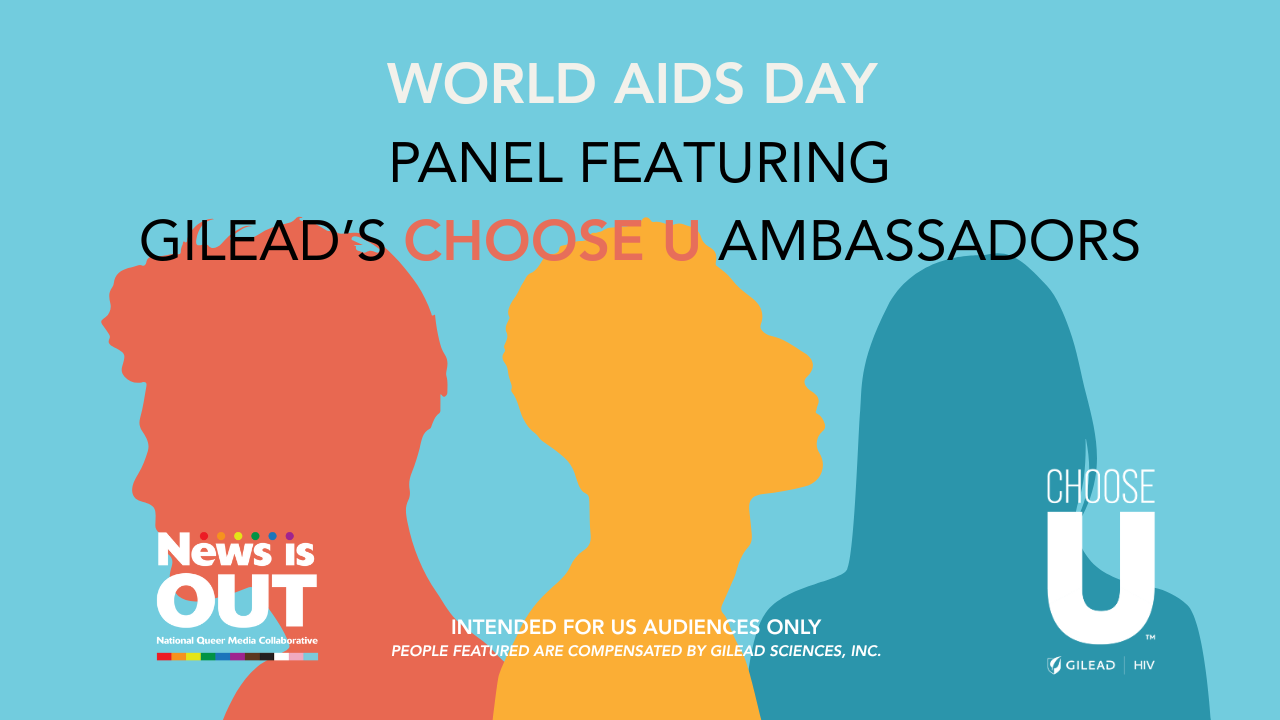
The Choose U World AIDS Day panel brought together three longtime advocates living with HIV to talk about care, stigma, and what living with HIV over the long-term means to them. The conversation featured Jahlove Serrano, Joyce Belton, and Andrew Nichols, who have each lived with HIV for more than 20 years. News is Out hosted the event in partnership with Gilead Sciences.
“Co-created with community representatives from around the world, Choose U is comprised of inspiring examples of how the outlook for aging with HIV has dramatically changed,” Gilead shared in the recent launch of the program. “By focusing on the real-world experiences of people in different circumstances, Choose U spotlights individuals prioritizing starting and staying on HIV treatment, self-care, and overall strategies to help them lead healthier lives.”
The Choose U ambassadors opened with a clear message: Lived experience drives understanding.
Each panelist talked through the decisions, relationships, and periods of uncertainty that shaped their HIV care. They also described their approaches to HIV treatment and adherence, including the importance of staying on treatment to help lower the risk of HIV drug resistance. They reflected on the shifts they have seen in HIV treatment over the decades, the value of honest conversations with providers, and how staying engaged in care and on HIV treatment helped them lead longer, healthier lives.
The panel discussed U=U, which stands for “Undetectable equals Untransmittable.” Undetectable means there is so little virus in the blood that a lab test can’t measure it. Research shows that taking HIV treatment as prescribed, and getting to and staying undetectable, prevents HIV from spreading through sex.
The panelists also spoke about the emotional side of living with HIV over the long-term and the stigma they have faced. Joyce described a personal moment when her pastor visited her in the hospital and how that experience began her work educating her church community about HIV.
Jahlove talked about how his biological family reacted to his diagnosis. “When I disclosed my status, they told me that I put a shame on the family,” said Jahlove. When he shared his status with his peers, they responded with support, which gave him a sense of empowerment.
Andrew, a professional therapist, described how he has experienced stigma in dating and in his workplace, and why he turns to therapy for guidance. “Therapy has really helped me rebuild my confidence and realize my self-worth has to come from me,” said Andrew. “Then after that, I can help with the greater community.”
The panel closed with a message for others living with HIV: They encouraged viewers to start and stay engaged in HIV treatment and care, ask questions, and rely on supportive networks. Their stories show how starting and staying on treatment over the long-term, community, and affirmation can shape well-being.
A recording of the full 30-minute event is now available on YouTube, which you can access here.
Health
The harsh truth about HIV phobia in gay dating
HIV and stigma remain baked into queer dating culture

Uncloseted Media published this article on Dec. 9.
This story was produced with the support of MISTR, a telehealth platform offering free online access to PrEP, DoxyPEP, STI testing, Hepatitis C testing and treatment and long-term HIV care across the U.S. MISTR did not have any editorial input into the content of this story.
By SAM DONNDELINGER | In his room, 19-year-old Cody Nester toggles between Grindr profiles on his phone.
As he senses chemistry with a match, he knows he has to flag something that could be a deal breaker.
“Did you see on my profile that I’m HIV positive?” he writes.
The reply arrives instantly.
“You’re disgusting. I don’t know why you’re on here.” Seconds later, the profile disappears, suggesting Nester is blocked.
“He went out of his way to say that. People could at least be more aware, ask questions, and understand the reality [of living with HIV] instead of attacking us,” Nester told Uncloseted Media.
“I would say 95 percent of people respond that way,” says Nester, who lives in Hollywood, Fla., and works at a Mexican restaurant. “The entire conversation is going fine. They’re down to meet up and then right when I mention [HIV], it’s always, ‘Oh no, never mind.’”
Some other messages he’s received include:
“You’ll never get anything in your life.”
“Why don’t you die?”
“Why are you on here?”
More often, it’s silence, a cold “No” or a sudden block.
“It’s like you’re a white fish in a school of black fish,” he says. “You’re immediately the odd one out.”
Even though Nester’s undetectable status makes it impossible for him to transmit HIV to partners during sex, he experiences stigma around HIV, something which nearly 90 percent of Americans agree still exists, according to a 2022 GLAAD report. And a survey shared in 2019 found that 64 percent of respondents would feel uncomfortable having sex with someone living with HIV, even on effective treatment. The emotional cost of this stigma is a significant barrier to intimacy and can result in a loss of self-esteem, fear of disclosure and suicidal thoughts.
What the science says — and why it doesn’t seem to matter
“The fear comes from antiquated ideas around HIV,” says Xavier A. Erguera, senior clinical research coordinator at University of California, San Francisco,’s Division of HIV, Infectious Diseases & Global Medicine. “A lot of people who are newly diagnosed still fear it’s a death sentence. Even though we have medications now to treat it effectively, and it’s basically a chronic condition, people haven’t caught up.”
Since 1996, antiretroviral therapies have developed to where they can suppress the virus to levels so low that it is undetectable in the blood, and thus not able to be transmitted to sexual partners. This is known as Undetectable = Untransmittable, or U=U. According to a Centers for Disease Control and Prevention report from 2024, 65 percent of HIV-positive cases are virally suppressed.
Another line of defense is pre-exposure prophylaxis (PrEP), which reduces the risk of acquiring HIV from sexual intercourse by roughly 99 percent when taken as prescribed. Approved by the Food and Drug Administration in 2012, the medication launched as a once-a-day pill and was hailed as a breakthrough as it transformed the sex lives of gay men, which had been shaped by decades of fear about HIV complications and about where AIDS came from.
“Internal logic doesn’t reflect what we know scientifically,” says Kim Koester, associate professor in the Department of Medicine at UCSF. “I was very optimistic when PrEP came out. The drug works, so why wouldn’t everyone use it?”
Even with PrEP use on the rise, less than 600,000 Americans used it in 2024, and Koester says skepticism and judgments about taking the drug persist.
“The phobia is pervasive,” Koester told Uncloseted Media. “People believe that others get the disease because of their lifestyle. … PrEP was supposed to be the antidote to the threat of HIV, reduce the anxiety, and make you more open to who you are and the sex you want. It’s supposed to be liberating. It is part of the answer. But it’s not enough. We don’t have enough people using PrEP for it to make the dent in the stigma we need.”
According to a 2023 study of seven informants living with HIV, public stigma stems from problematic views from society that those living with HIV are “a dangerous transmission source,” “disgraceful” and “violators of social and religious norms who have committed deviant behavior.”
Laramie Smith, assistant professor of Global Public Health at the University of California, San Diego, says this stigma is unwarranted and fueled by misunderstanding:
“With today’s treatments, it shouldn’t be a life-altering identity shift. It should be no different than, ‘I have diabetes.’ If you’re virally suppressed, it shouldn’t matter whether you’re friends with someone, whether you’re sleeping with someone — the science shows us that.”
How HIV phobia shows up online
Nester, who contracted HIV last year from a Grindr hook-up who insisted he was negative, says he is just starting to accept his diagnosis. “I didn’t go back on the apps for a long time after that. It messed with my mental health … realizing I’d have to take medication for the rest of my life.”
Since he started dating again this year, returning to apps like Grindr and Sniffies, he has faced a new normal. He tries to do everything “right” and disclose his status early. Even on his Grindr profile, he identifies as “poz,” slang for HIV-positive.
Still, he says most people ghost him once they find out. “The second I bring it up, it’s ‘No,’” says Nester. “The amount of discrimination you get … it’s always the same pattern. … People don’t know, and they don’t want to know. It messes with you.”
This discrimination may be fueled by a deprioritization of HIV awareness programs across the country. Earlier this month, the U.S. State Department did not commemorate World AIDS Day for the first time in 37 years. HIV prevention programs have been slashed, especially in conservative districts, and only 25 states and D.C. require both HIV and sex education. In many states, health curricula often lag behind current science and omit teaching about PrEP, gay sex and concepts like U=U. Research shows that Gen Z is currently the least educated generation about HIV.
“I could go all day explaining HIV, but people don’t want to listen,” says Nester, who is part of Gen Z. “People don’t want to learn about it; they just want to avoid it.”
HIV anxiety and public stigma shaped by history
Even in more progressive areas, stigma still exists. Damian Jack, a 45-year-old from Brooklyn, remembers sitting in an exam room in 2009 as a doctor explained how low his T-cell count was, which is a hallmark of HIV infection.
“I started hysterically crying,” he told Uncloseted Media. “HIV meant death. That’s what I thought.”
In 1981, when Jack was 1 year old, the first reports of a mysterious and deadly immune deficiency syndrome, which would later be named AIDS, appeared in the U.S. Growing up, Jack saw countless terrifying images of men on their deathbeds with Kaposi sarcoma, the purple lesions the media once called “gay cancer.” Public misinformation and fearmongering spread ideas that AIDS was a disease that “only gay men and drug users get.” And politicians often equated it with homosexuality and moral failure, calling it a “gay plague.” It wasn’t until September 1985, four years after the crisis began and thousands had died, that President Ronald Reagan first publicly mentioned AIDS.
Decades later, the emotional residue of that era and the shame associated with the virus lingers.
Hours after learning of his diagnosis, Jack faced his first encounter with rejection. He already had a date planned that night, and his doctor and friends encouraged him to go.
They had a great time until the date asked him: “Are you negative or positive?”
He told the truth.
“It was just understood there wouldn’t be a second date,” says Jack. “I remember thinking, ‘This is how dating is going to be now.’ I felt so anxious telling guys. It followed me everywhere. I don’t think that anxiety ever truly goes away.”
The emotional impact of HIV stigma
For those who are HIV-negative, experts say that “stigma’s whole design is to ‘other.’”
“The ‘us versus them’ creates that false sense of safety when it comes to HIV,” says Smith. “If I can believe that someone did something to deserve their diagnosis, and I’m not that [kind of person], then I’m safe.”
This othering is painful and can lead to shame, fear and isolation, and it is linked to a higher risk of depression and anxiety.
“If I’m undesirable, and that’s what those messages are communicating, that threatens your sense of safety, your sense of belonging and the fundamental desire we all have to be loved,” Smith says. “And that starts to reinforce the thinking that ‘I am not worthy. This virus that I have means that I’m not lovable. I am not safe showing up among other men.’”
“I pretend it doesn’t hurt, but some things do sting a little bit,” Nester says. “You start thinking, ‘Am I really that disgusting? Am I really that singled out?’”
When public stigma turns inward
“Internalized stigma is what occurs when applying the stereotypes about who gets HIV, the prejudice, the negative feelings, onto yourself,” says Smith.
In 2024, 38 percent of people living with HIV reported internalized stigma. And studies show that it can predict hopelessness and lower quality of life, even when people are engaged in care or virally suppressed.
Internalized stigma can also affect how people practice safe sex and communicate about the virus. A 2019 survey of men who have sex with men found that individuals who perceived greater community-level stigma were less likely to be aware of — and use — safer-sex functions available on dating apps, such as HIV-status disclosure fields, as well as sexual health information and resources.
“[HIV phobia] is probably the most intense, subvert bigotry I think you could experience,” Joseph Monroe Jr., a 48-year-old living in the Bronx, told Uncloseted Media.
On dating apps, men have messaged him things like, “You look like you’ve got that thing” and “Go ahead and infect someone else.”
Monroe has also dealt with misinformed people who rudely opine about how he contracted the virus: “Who fucked you? That’s how you got it, right?” people will say to him.
“You end up internalizing all these stereotypes about who gets HIV — that you were promiscuous, that you didn’t care about yourself, that you did something wrong,” says Smith. “You carry that in, and then you have to relearn: ‘No, I didn’t. This is just a health condition.’”
What HIV acceptance looks like and raising awareness
For those living with HIV, acceptance feels far away.
“You’re living under this threat of HIV and the threat that others find you threatening. It inhabits you socially and sexually,” Koester says. “People are hunkering down. Not putting themselves out there and having a mediocre quality of life. To have a sense of empowerment, you have to be legitimate and seen in the world and it’s hard to do that with the stigma that exists.”
Researchers say the path forward lies as much in conversation as in medicine.
Koester says she talks about HIV and PrEP anywhere she can, including in salons, cafes and restaurants. “Whenever I get into a cab with someone, I’m going to bring up HIV so the driver gets accustomed to hearing about it. … We have a long way to go in terms of exposure and awareness and every little bit helps.”
Part of this lies in increasing awareness through targeted marketing campaigns. PrEP is still profoundly misunderstood outside major urban centers, with uneven uptake among minority groups and usage gaps in the Bible Belt. And a 2022 U.S. survey found that 54.5 percent of people living with HIV didn’t know what U=U meant, and less than half of Americans agree that people living with HIV who are on proper medications cannot transmit the virus.
While eradicating stigma is slow, there is hope for acceptance.
Years after Jack’s diagnosis, in 2021, he told a man he was on a third date with that he was HIV-positive but undetectable. His date’s reply was almost casual:
“Oh — is that it? I thought you were going to say you had a boyfriend or something. I’m on PrEP. You’re fine.”
“It felt so good to hear him say that and accept me,” says Jack. “I was like, ‘This is my person. You’re my person.’” One year later, they got married.
Back in Florida, 19-year-old Cody Nester isn’t feeling this acceptance. He still scrolls past profiles that read “Only negative guys” and tries to ignore the hateful messages.
“It still hurts, but I know it’s coming from fear,” he says. “I wasn’t too informed about HIV before I got it. … When I got it, I really jumped into the rabbit hole and began to learn. I really do think [HIV and stigma] is because people are not knowledgeable. … When people don’t know details, they tend to get scared.”
Additional reporting by Nandika Chatterjee.
-

 Real Estate5 days ago
Real Estate5 days agoTop buyer-friendly markets for the LGBTQ community
-

 Virginia5 days ago
Virginia5 days agoAbigail Spanberger sworn in as Va. governor
-

 Autos5 days ago
Autos5 days agoHot rod heaven: Chevy Corvette, Dodge Charger
-

 Virginia4 days ago
Virginia4 days agoTwo gay candidates running in ‘firehouse’ Va. House of Delegates primary in Alexandria





